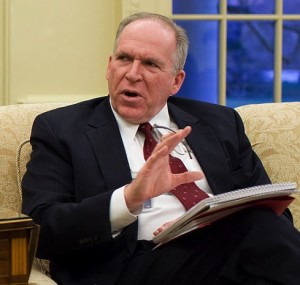The Senate on Thursday voted to confirm President Obama’s nominee for Director of the CIA, John Brennan, in a 63-34 vote after it was delayed in a historic filibuster led by Senator Rand Paul that drew unprecedented attention to the administration’s expansive powers in the drone war.
 “I will speak as long as it takes,” Paul said in the opening remarks of his filibuster, “until the alarm is sounded from coast to coast that our Constitution is important, that your rights to trial by jury are precious, that no American should be killed by a drone on American soil without first being charged with a crime, without first being found to be guilty by a court.”
“I will speak as long as it takes,” Paul said in the opening remarks of his filibuster, “until the alarm is sounded from coast to coast that our Constitution is important, that your rights to trial by jury are precious, that no American should be killed by a drone on American soil without first being charged with a crime, without first being found to be guilty by a court.”
Paul said he would continue to block the vote on Brennan unless the Obama administration said explicitly that targeting American citizens on US soil for death by drone would be unconstitutional.
In a letter responding to Paul’s repeated inquiries on the question, the Obama administration’s Attorney General Eric Holder wrote that the President does have the authority to kill US citizens on US soil without any due process.
“It is possible, I suppose, to imagine an extraordinary circumstance in which it would be necessary and appropriate under the Constitution and applicable laws of the United States for the President to authorize the military to use lethal force within the territory of the United States,” Holder wrote.
The back-and-forth began after the leaking of a Justice Department white paper on targeted killings of US citizens, which was written to retroactively justify the CIA’s assassination, on the orders of the President, of US-born Anwar al-Awlaki in Yemen in 2011. Other Americans have also been killed in the drone war, including AbdulRahman Awlaki, Anwar’s 16-year old son.
On Thursday, before the final vote to confirm Brennan, Republican Senators John McCain (R-AZ) and Lindsey Graham (R-SC) lambasted Paul and his filibuster.
“I find the question offensive,” Sen. Graham said. “I do not believe that question deserves an answer.”
Paul responded to the tirade from the hawkish duo, saying the two “think the whole world is a battlefield.”
Paul had warned that the Obama administration’s loose interpretation of constitutional restrictions on targeted killings could result in American citizens being hit by Hellfire missiles “sitting in a cafe” somewhere.
McCain argued Paul’s hypotheticals bring the debate into the “realm of the ridiculous.” Graham concurred, saying Paul’s “paranoia” only “cheapens the debate.”
But Paul legitimized his hypotheticals by mentioning the fact that current domestic counter-terrorism efforts, like the Department of Homeland Security’s “fusion centers,” have targeted for surveillance Americans entirely uninvolved with terrorism.
 A Senate investigation last year found that “when fusion centers did address terrorism,” which was rare, “they sometimes did so in ways that infringed on civil liberties,” the AP reported. “The centers have made headlines for circulating information about Ron Paul supporters, the ACLU, activists on both sides of the abortion debate, war protesters and advocates of gun rights.”
A Senate investigation last year found that “when fusion centers did address terrorism,” which was rare, “they sometimes did so in ways that infringed on civil liberties,” the AP reported. “The centers have made headlines for circulating information about Ron Paul supporters, the ACLU, activists on both sides of the abortion debate, war protesters and advocates of gun rights.”
Later on Thursday, Attorney General Holder wrote another letter addressed to Paul. It read: “It has come to my attention that you have asked an additional question: ‘Does the president have the authority to use a weaponized drone to kill an American not engaged in combat on an American soil?’ The answer is no.”
In an interview, Paul said he was satisfied with the answer and promised to let the vote on Brennan go forth. When it came time to confirm Brennan, Paul – along with 33 other senators – voted against him.
Senator Patrick Leahy (D-VT) also voted against Brennan’s confirmation. The reason, he explained, was that “the administration has stonewalled me and the Judiciary Committee for too long on a reasonable request to review the legal justification for the use of drones in the targeted killing of American citizens.”
Rand’s filibuster did much to popularize criticisms of the drone war. Although his request was for clarification on the narrow question of the President targeting for assassination US citizens on US soil, he criticized many aspects of the drone program altogether – including its application on non-citizens in Pakistan and Yemen.





Senator Rand's action in Senate was as necessary as it was almost a joke in the house of Israel Firsters, who would object only if Israeli terrorists become the targets of drone program. With totally apathetic general population of US any action, even a joke is permissible in fight against tyranny of Isreal-Firsters because it is possible that it will wake up citizenry.
"Non-combatant" Americans.
So graham thinks the question as to whether the King can snuff you out without due process on American soil is offensive. Wow.Just Wow.